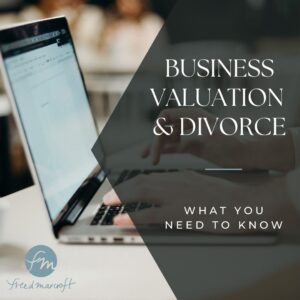Business Valuation & Divorce
 When a spouse owns a business, business valuation becomes an especially hot topic in divorce. Property division is typically a significant driver in divorce negotiations, but, for example, the emotional and financial nuances and stakes increase when a business is involved. A key component of addressing concerns around a business in divorce is valuing that business. Determining the value of a business can be a complex task, often involving the expertise of financial professionals, forensic accountants, and experienced divorce attorneys.
When a spouse owns a business, business valuation becomes an especially hot topic in divorce. Property division is typically a significant driver in divorce negotiations, but, for example, the emotional and financial nuances and stakes increase when a business is involved. A key component of addressing concerns around a business in divorce is valuing that business. Determining the value of a business can be a complex task, often involving the expertise of financial professionals, forensic accountants, and experienced divorce attorneys.
This blog post will explore the intricacies of business valuation in divorce cases and highlight its importance in divorce proceedings.
Divorce Business Valuation
Both spouses should focus on the best approach to divide assets when their marriage ends. Regardless of whose name the business is in, absent an enforceable prenuptial agreement that says otherwise, the business is part of the property that the court must decide whether and how to divide.
To divide property, you first need to get your arms around (1) what property exists and (2) the value of that property. Business valuation is the process of determining the economic value of a company. It involves assessing both tangible and intangible assets, evaluating financial statements, considering market trends, and determining the potential for future growth or decline. During a divorce, accurately valuing a business is essential for ensuring a fair and equitable division of marital assets. Valuation methods vary, but in Connecticut, most often include the asset-based, market, or income-based approach.
Read: Small Business and Divorce?
How Is a Business Divided in a Divorce?
During a divorce, you can approach dividing a business in several ways. The best way for you depends on your specific circumstances, and the valuation of the business is critical to deciding.
For example, one option is to sell the business and distribute the proceeds equitably between the spouses. This approach ensures a clean break and allows both parties to move forward independently. Alternatively, one spouse may retain the business while offsetting the other spouse’s share with other assets of comparable value, such as real estate or investments. This method aims to provide a fair distribution while allowing the business to continue operating. Other possibilities include co-ownership or a buyout agreement, where one spouse buys out the other’s share of the business based on a negotiated value.
Ultimately, the best approach depends not only on the business’s value but also on the unique dynamics of the spouses and their individual long-term financial goals.
Read: What Is Equitable Division in Connecticut?
The Role of Experts in Valuing Businesses
Your divorce attorney will be familiar with experts (generally forensic accountants and financial professionals) specializing in business valuation in divorce. These experts work closely with divorce attorneys to ensure both an accurate assessment and proper representation of the business’ value during negotiations or in court.
Read: 6 Strategies to Protect Your Business During Divorce
Some Factors Business Valuation Experts Consider When Valuing a Business
Your business valuation expert will generally comprehensively analyze various factors that contribute to a business’s value.
These factors typically can include:
- Financial Statements: The business’s financial records, including income statements, balance sheets, and cash flow projections.
- Market Conditions: The current economic landscape, including industry trends and market conditions.
- Asset Valuation: Tangible assets, such as real estate, equipment, inventory, and intellectual property.
- Earnings and Cash Flow: Historical and projected revenues and its cash flow patterns.
- Intangible Assets: Intellectual property, patents, trademarks, brand reputation, customer list, and goodwill.
- Business Management and Succession Planning: The expertise, experience, and market value of key personnel, as well as the business’s plan for future leadership and management.
Read: Changes to the Business You Own With Your Spouse During Divorce
Business Valuation in Mediation, Collaborative Divorce, and Litigation
In business valuation cases, alternative dispute resolution (“ADR”) methods such as mediation or collaborative divorce can be beneficial. These approaches encourage open communication, reduce animosity, and allow spouses to reach a mutually acceptable agreement outside court. In addition, mediators and collaborative attorneys with experience in these kinds of cases can facilitate productive discussions and help craft creative solutions.
It’s also important to note that in a mediation or collaborative divorce (and sometimes even in a low-conflict litigation), it may be possible for the spouses to retain one business evaluator jointly. In more traditional litigation, it’s more common to have a “war of the experts,” with each spouse hiring and paying their own evaluator to conduct the business valuation and testify on their client’s behalf. If this sounds more expensive and time-consuming, it typically is. But it may be the best way to go if you can’t agree to one business evaluator or valuation.
Read: ADR & Divorce
Read: Settlement & Divorce
Business Owner Divorce
There are unique challenges for business owners going through a divorce. For example, closely held businesses present significant practical, emotional, and financial concerns and opportunities. Retaining counsel experienced in this area and the proper expert will help you navigate this terrain confidently as you work toward your future goals. If you are considering a divorce, own a business, and have questions, please reach out to us.








